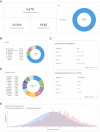Color Data v2: a user-friendly, open-access database with hereditary cancer and hereditary cardiovascular conditions datasets
- PMID: 33181822
- PMCID: PMC7661094
- DOI: 10.1093/database/baaa083
Color Data v2: a user-friendly, open-access database with hereditary cancer and hereditary cardiovascular conditions datasets
Abstract
Publicly available genetic databases promote data sharing and fuel scientific discoveries for the prevention, treatment and management of disease. In 2018, we built Color Data, a user-friendly, open access database containing genotypic and self-reported phenotypic information from 50 000 individuals who were sequenced for 30 genes associated with hereditary cancer. In a continued effort to promote access to these types of data, we launched Color Data v2, an updated version of the Color Data database. This new release includes additional clinical genetic testing results from more than 18 000 individuals who were sequenced for 30 genes associated with hereditary cardiovascular conditions as well as polygenic risk scores for breast cancer, coronary artery disease and atrial fibrillation. In addition, we used self-reported phenotypic information to implement the following four clinical risk models: Gail Model for 5-year risk of breast cancer, Claus Model for lifetime risk of breast cancer, simple office-based Framingham Coronary Heart Disease Risk Score for 10-year risk of coronary heart disease and CHARGE-AF simple score for 5-year risk of atrial fibrillation. These new features and capabilities are highlighted through two sample queries in the database. We hope that the broad dissemination of these data will help researchers continue to explore genotype-phenotype correlations and identify novel variants for functional analysis, enabling scientific discoveries in the field of population genomics. Database URL: https://data.color.com/.
© The Author(s) 2020. Published by Oxford University Press.
Figures


Similar articles
-
A scalable, aggregated genotypic-phenotypic database for human disease variation.Database (Oxford). 2019 Jan 1;2019:baz013. doi: 10.1093/database/baz013. Database (Oxford). 2019. PMID: 30759220 Free PMC article.
-
Polygenic predisposition to breast cancer and the risk of coronary artery disease.Int J Cardiol. 2019 Sep 15;291:145-151. doi: 10.1016/j.ijcard.2019.05.051. Epub 2019 May 24. Int J Cardiol. 2019. PMID: 31155334
-
The project data sphere initiative: accelerating cancer research by sharing data.Oncologist. 2015 May;20(5):464-e20. doi: 10.1634/theoncologist.2014-0431. Epub 2015 Apr 15. Oncologist. 2015. PMID: 25876994 Free PMC article.
-
Phenotype-genotype correlation in familial breast cancer.J Mammary Gland Biol Neoplasia. 2011 Apr;16(1):27-40. doi: 10.1007/s10911-011-9204-6. Epub 2011 Mar 12. J Mammary Gland Biol Neoplasia. 2011. PMID: 21400086 Review.
-
Recognition and management of hereditary breast cancer syndromes.Oncologist. 2004;9(1):13-24. doi: 10.1634/theoncologist.9-1-13. Oncologist. 2004. PMID: 14755011 Review.
Cited by
-
Genetic testing for familial hypercholesterolemia-past, present, and future.J Lipid Res. 2021;62:100139. doi: 10.1016/j.jlr.2021.100139. Epub 2021 Oct 16. J Lipid Res. 2021. PMID: 34666015 Free PMC article. Review.
-
Whole-genome sequencing as an investigational device for return of hereditary disease risk and pharmacogenomic results as part of the All of Us Research Program.Genome Med. 2022 Mar 28;14(1):34. doi: 10.1186/s13073-022-01031-z. Genome Med. 2022. PMID: 35346344 Free PMC article.
-
GA4GH: International policies and standards for data sharing across genomic research and healthcare.Cell Genom. 2021 Nov 10;1(2):100029. doi: 10.1016/j.xgen.2021.100029. Cell Genom. 2021. PMID: 35072136 Free PMC article.
References
-
- Kwon D.H.-M., Borno H.T., Cheng H.H. et al. (2019) Ethnic disparities among men with prostate cancer undergoing germline testing. Urol. Oncol., 38, 80.e1–80.e7. - PubMed
-
- (2018) Science Extension | Garvan institute of medical research https://www.garvan.org.au/research/kinghorn-centre-for-clinical-genomics... (accessed Jan 13, 2020).
-
- Gail M.H., Brinton L.A., Byar D.P. et al. (1989) Projecting individualized probabilities of developing breast cancer for white females who are being examined annually. J. Natl. Cancer Inst., 81, 1879–1886. - PubMed
Publication types
MeSH terms
LinkOut - more resources
Full Text Sources
Medical
Molecular Biology Databases

